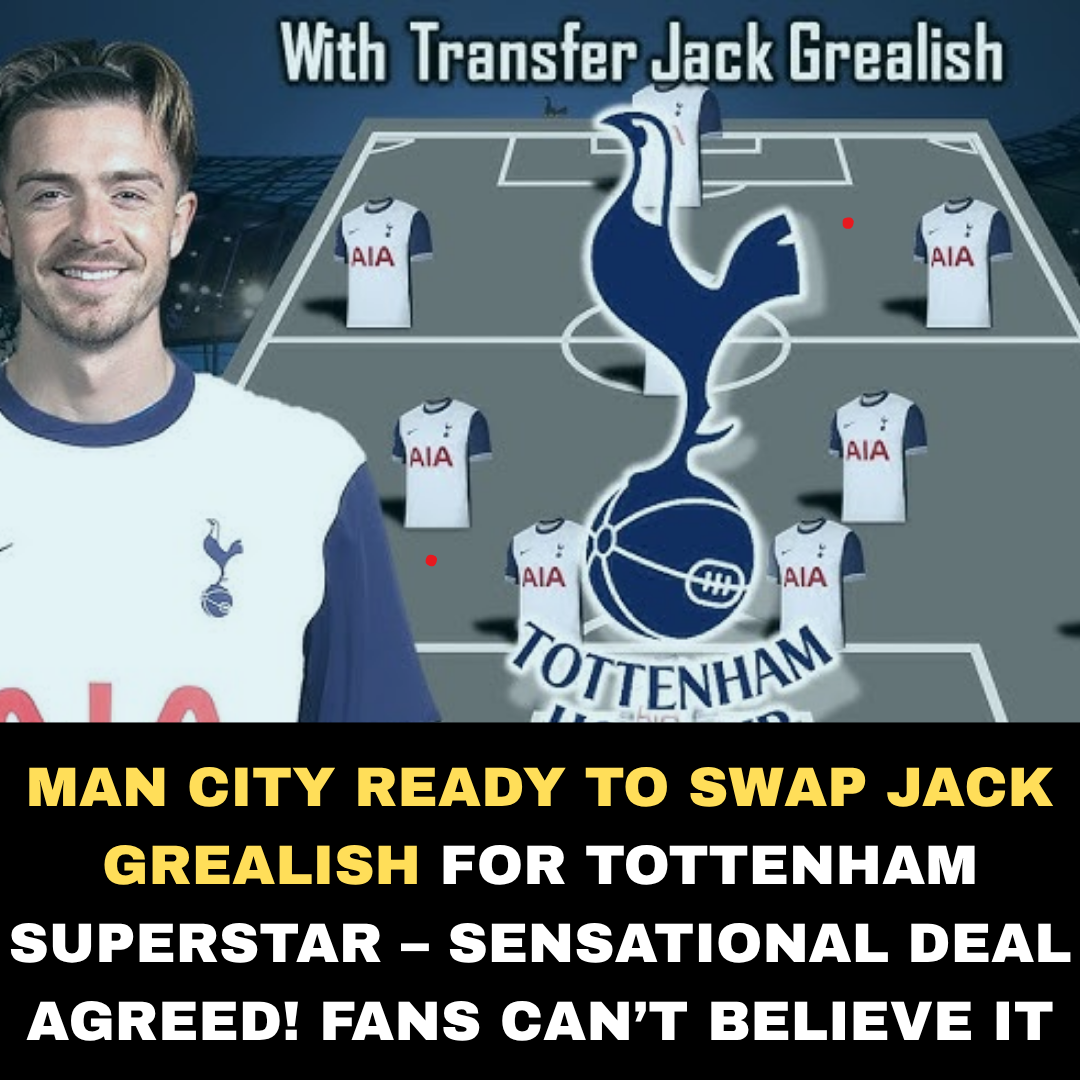Tottenham make Jack Grealish decision after Thomas Frank meeting

The summer transfer window has brought with it a whirlwind of speculation, negotiations, and strategic planning as clubs across Europe look to strengthen their squads for the upcoming season. Among the most intriguing storylines developing is Tottenham Hotspur’s pursuit of Manchester City winger Jack Grealish, a saga that has taken several unexpected turns and now appears to have found new direction under the guidance of recently appointed manager Thomas Frank.
The Danish Revolution at N17
Thomas Frank’s arrival at Tottenham Hotspur represents more than just a change in management; it signals a fundamental shift in the club’s approach to player recruitment and tactical philosophy. The Danish tactician, who made his name transforming Brentford from a Championship side into a stable Premier League outfit, brings with him a reputation for astute player evaluation and an eye for maximizing potential in underutilized talents.
Frank’s appointment came at a crucial juncture for Spurs, with the club having secured Champions League qualification for the upcoming season. This achievement has not only validated the previous season’s efforts but has also opened up new possibilities in the transfer market, allowing Tottenham to attract players who might previously have been beyond their reach. The prospect of European football at the highest level has become a powerful bargaining chip in negotiations, and Frank appears keen to leverage this advantage to full effect.
The new manager’s initial assessment of the squad has been thorough and methodical. Sources close to the club suggest that Frank has conducted extensive video analysis sessions, examining not just individual performances but how potential targets might fit into his tactical framework. This comprehensive approach reflects the analytical mindset that served him so well at Brentford, where limited resources demanded that every signing be perfectly suited to the team’s playing style.
Jack Grealish: The Enigmatic Talent
Jack Grealish’s journey from Aston Villa’s academy product to Manchester City’s record signing has been one of the most compelling narratives in recent English football. The £100 million move to the Etihad Stadium in 2021 was meant to represent the pinnacle of his career development, offering him the chance to compete for the sport’s most prestigious trophies while working under one of the game’s greatest tactical minds in Pep Guardiola.
However, the reality of life at Manchester City has proven more complex than many anticipated. While Grealish has undoubtedly added to his trophy collection, including Premier League titles and the coveted Champions League crown, questions have persisted about whether his unique talents have been fully utilized within Guardiola’s system. The Spanish manager’s tactical approach, while undeniably successful, often requires wide players to fulfill specific positional and pressing responsibilities that can sometimes constrain the more instinctive elements of a player’s game.
Grealish’s strengths have always centered around his ability to carry the ball, draw fouls in dangerous areas, and create moments of individual brilliance that can unlock tight games. His low center of gravity, combined with exceptional close control, makes him almost impossible to dispossess when he’s in full flow. These attributes were perfectly showcased during his time at Aston Villa, where he often single-handedly dragged his team through difficult periods with moments of inspiration.
At Manchester City, while his tactical discipline has improved markedly, there have been suggestions that some of his natural flair has been tempered by the demands of playing in such a structured system. This has led to speculation about whether a move to a different environment might allow him to rediscover the form that made him one of the most exciting players in English football just a few years ago.
The January Foundation
Tottenham’s interest in Grealish is not a recent development born out of Frank’s arrival. The groundwork for a potential move was laid during the January transfer window, when Spurs’ recruitment team held extensive discussions with the player’s representatives about a possible mid-season switch. These conversations were reportedly detailed and covered various aspects of a potential transfer, from financial terms to the role Grealish would play within the team structure.
The January talks provided valuable insight into Grealish’s mindset regarding his future at Manchester City. While he remained publicly committed to his current club, sources suggest that he was intrigued by the possibility of taking on a more central role in Tottenham’s attacking plans. The prospect of being a key figure in Spurs’ push for Champions League qualification was reportedly appealing, particularly given the competition for places in City’s squad.
However, the January window proved challenging for all parties involved. Manchester City’s reluctance to strengthen a direct rival, combined with the complexities of mid-season transfers, meant that negotiations failed to progress beyond the exploratory stage. The timing also worked against Tottenham, as they were in the midst of their own tactical evolution and were hesitant to make such a significant investment without being certain of how a new signing would fit into their plans.
The failure to complete a January deal did not diminish either party’s interest in pursuing the transfer at a later date. Instead, it provided valuable experience in understanding each other’s positions and requirements, creating a foundation that could be built upon when circumstances became more favorable.
Thomas Frank’s Vision
The arrival of Thomas Frank has injected new energy into Tottenham’s pursuit of Grealish, but not in the way many initially expected. Early reports suggested that Frank’s appointment might signal the end of Spurs’ interest in the Manchester City winger, with some outlets speculating that the Danish manager preferred to focus on different types of players who better suited his tactical philosophy.
However, recent developments have revealed that the opposite is true. Frank has not only endorsed the club’s pursuit of Grealish but has actively championed the move as a key component of his strategic vision for the upcoming season. The manager’s assessment of Grealish appears to be based on a deep understanding of how the player’s unique skill set could be deployed within his tactical framework.
Frank’s tactical approach at Brentford was characterized by flexibility and adaptability, with the ability to adjust formations and playing styles based on the personnel available and the specific challenges posed by different opponents. This adaptability suggests that he sees potential in Grealish that goes beyond the traditional winger role, possibly envisioning him as a player who could operate in multiple positions across the attacking third.
The Danish manager’s experience in maximizing the potential of players who had previously struggled to find their best form elsewhere makes him particularly well-suited to getting the best out of Grealish. His track record of improving players through tactical adjustments and personalized coaching approaches suggests that he might be able to help the England international rediscover the form that made him such a coveted player in the first place.
Strategic Importance of Wide Options
Frank’s emphasis on rejuvenating Tottenham’s wide options reflects a broader strategic vision for how the team should approach the upcoming season. The return to Champions League football demands a squad with both depth and quality, capable of competing on multiple fronts without experiencing a significant drop in performance levels.
Tottenham’s current wide options, while talented, lack the proven quality and experience needed to compete at the highest level consistently. The addition of a player like Grealish would not only improve the starting eleven but would also provide valuable competition for places, potentially raising the performance levels of all attacking players in the squad.
The Champions League presents unique tactical challenges that require players with specific skill sets. Grealish’s experience in European competition, combined with his ability to perform in high-pressure situations, makes him an attractive option for a team looking to make an impact on their return to the continent’s premier competition.
Frank’s vision appears to center around creating a more dynamic and unpredictable attacking unit, capable of breaking down the deep defensive blocks that teams often employ in European competition. Grealish’s ability to draw fouls and create set-piece opportunities could prove particularly valuable in games where goals are at a premium.
The Financial Dimension
Any potential transfer for Jack Grealish would represent a significant financial commitment for Tottenham Hotspur, requiring careful consideration of both the immediate costs and long-term implications. Manchester City’s substantial investment in the player means that any sale would need to recoup a significant portion of their original outlay, potentially making this one of the more expensive transfers of the summer window.
However, Tottenham’s return to the Champions League has improved their financial position considerably, providing additional revenue streams that could help fund such an ambitious signing. The commercial benefits of securing a high-profile English international could also help offset some of the transfer costs through increased merchandise sales and sponsorship opportunities.
The structure of any potential deal would likely be crucial to its completion. Creative financing arrangements, potentially involving performance-related bonuses or structured payment plans, could help make the transfer more palatable to all parties involved. Tottenham’s recent experience with similar high-profile signings provides them with valuable expertise in navigating these complex negotiations.
Frank’s input into the financial aspects of the transfer appears to be significant, with the manager making it clear that he views Grealish as a priority target worth the substantial investment required. This level of managerial backing could prove crucial in convincing the club’s hierarchy to pursue the transfer aggressively.
Tactical Integration
The question of how Jack Grealish would fit into Thomas Frank’s tactical system represents one of the most intriguing aspects of this potential transfer. Frank’s approach at Brentford demonstrated his ability to adapt his tactics to maximize the strengths of his available players, suggesting that he would be willing to make adjustments to accommodate Grealish’s unique skill set.
Grealish’s versatility could prove particularly valuable in Frank’s system, with the player capable of operating effectively in various positions across the attacking third. His ability to drift infield from wide positions could create space for overlapping full-backs, while his press-resistant qualities could help the team maintain possession in advanced areas.
The England international’s experience in different tactical systems, from Villa’s more direct approach to City’s possession-based style, suggests that he would be capable of adapting to Frank’s requirements. His football intelligence and tactical awareness have improved significantly during his time at Manchester City, making him a more complete player than when he first moved to the Etihad.
Frank’s emphasis on creating chances through sustained pressure and territorial dominance could suit Grealish’s playing style perfectly. His ability to retain possession under pressure and gradually work his way into dangerous positions aligns well with the patient build-up play that characterized many of Frank’s most successful tactical implementations at Brentford.
The Competition Factor
Manchester City’s willingness to consider offers for Grealish likely stems from their own squad planning requirements and the need to balance their books in accordance with financial fair play regulations. The club’s substantial investment in other areas of the squad may necessitate some high-profile departures to maintain financial compliance while funding new signings.
Pep Guardiola’s tactical evolution has also seen the emergence of other players who can fulfill similar roles to Grealish, potentially making the England international more expendable than might have been the case in previous seasons. The development of younger players within the City system, combined with their continued investment in new talent, has created a situation where difficult decisions must be made about established squad members.
For Grealish personally, the opportunity to move to a club where he would be guaranteed a more central role in the team’s attacking plans could prove attractive. The chance to work with a manager who has specifically identified him as a key target, rather than one of many options, might appeal to a player who has sometimes struggled for consistent starting opportunities at his current club.
The prospect of playing in the Champions League with Tottenham, while potentially seeing reduced European opportunities at Manchester City due to squad rotation, could also influence his decision-making process. The guarantee of regular European football, combined with a potentially more prominent role, presents a compelling alternative to his current situation.
Looking Ahead
As the summer transfer window progresses, the Jack Grealish to Tottenham story promises to be one of the most closely watched sagas in European football. Thomas Frank’s endorsement of the move has clearly reinvigorated Spurs’ pursuit of the Manchester City winger, setting the stage for what could be one of the window’s most significant transfers.
The success or failure of this potential move could have far-reaching implications for all parties involved. For Tottenham, securing Grealish would represent a statement of intent as they prepare for their return to Champions League football, demonstrating their ambition to compete with the Premier League’s elite clubs. For Frank, it would provide him with a high-profile signing to help implement his tactical vision from the outset of his tenure.
For Grealish himself, the decision represents a pivotal moment in his career. At 29, he is entering what should be his peak years as a footballer, making the choice of where to spend the next phase of his career crucial to his legacy in the game. The opportunity to be the focal point of Tottenham’s attacking play under a manager who clearly values his contribution could provide the platform for him to recapture the form that once made him one of English football’s most exciting talents.
As negotiations continue and the transfer window evolves, the Jack Grealish situation will undoubtedly remain a source of fascination for football fans across the globe. Thomas Frank’s strategic vision for Tottenham Hotspur, with Grealish as a central component, represents an ambitious attempt to elevate the club to new heights in both domestic and European competition.















